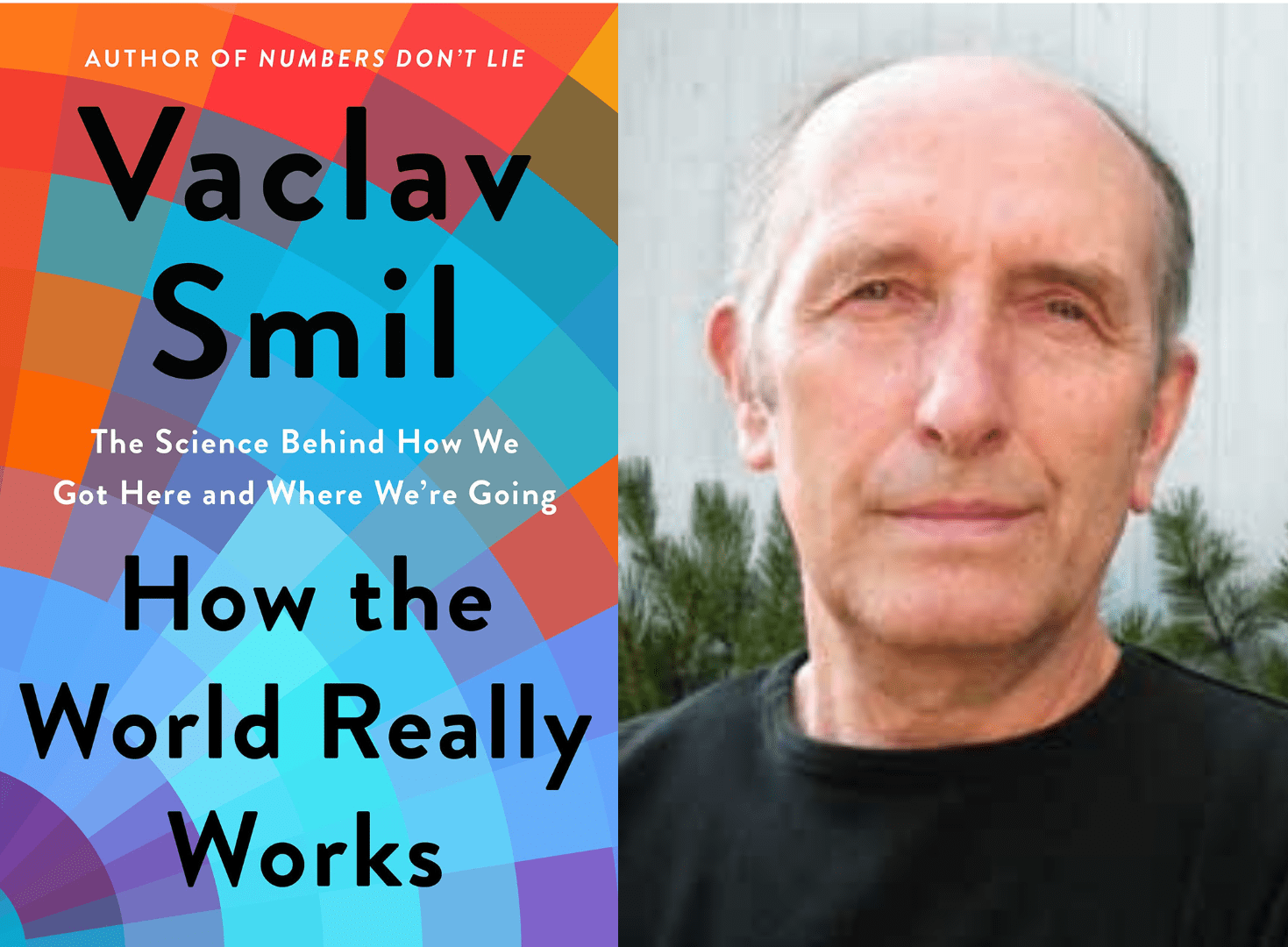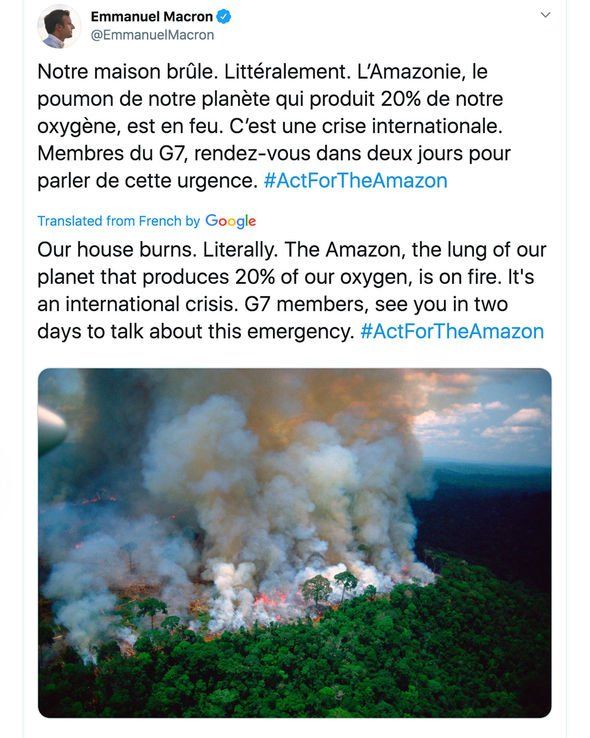10.8 | how does the world work anyway?
Smils' How the World Really Works reminds me of how a lot of smart dudes somehow always end up overestimating their ability to weigh into things they are not so immediately knowledgeable on.

... the besetting danger is not so much of embracing falsehood for truth, as of mistaking a part of the truth for the whole.
– John Stuart Mill
✉️ letter #43
Hi! I'm in Montreal right now, and while I would love to talk about that, I think I probably need a week or so to figure out what I'd want to say about this city, besides the fact that it's pretty and the food is good. It's pretty! The food is not only good, it's actually really shockingly great!
So instead, I'll launch into a review of a book that I finally got done reading: Vaclav Smils' How the World Really Works, which kind of touched a nerve for me as I finished it, because it reminds me of how a lot of smart dudes somehow always end up overestimating their ability to weigh into things they are not so immediately knowledgeable on - and well... that's annoying.
Annoying enough for me to have, while finishing it on a bus ride to Quebec City, felt compelled to type out this long review of it. And for me to want to devote my newsletter to this long review now.
So, some ground work: Václav Smil is a Czech-Canadian scientist, author, and professor known for his extensive work in the fields of energy, environmental studies, and sustainability. He's written a lot of really well reviewed books on that subject matter, and the one I'm takling about, released in 2022, offers a very factual run down of energy, food production, our material world, globalization, and the feasibility of the current environmental solutions on offer. He looks like this:

When the book is focused on climate change and the way that carbon-based energy sources and all their byproducts are now embedded into every aspect of our lives, this is a very, very useful book.
His breakdown into the ways fossil fuels are integrated into food production were especially illuminating - not only are there the “carbon miles” of transporting groceries across the world, even the way we derive nitrogen and potassium to fertilize our fields - a necessity to produce the calories for our current population of nearly 8 billion people - relies on oil.
It was equally interesting to see that calculation done for steel and concrete, two major resources that make up just about all of our built world. There's currently no way modern life can do without it - even if we stopped building new stuff, we'd still require more steel and concrete to keep everyone safe in everything we've already created. Plastics too. It's wasteful as water bottles and grocery bags, but an absolute necessity for the heavy metal free pipes that bring resources into our houses, for numerous small industrial parts, and the entire medical field - feeding tubes, sterile packaging, PPE etc.
That part was all fine. Somewhere along the middle though, it started to feel like someone told him his book was too short, and he just began randomly picking things he wanted to chat about. There's an entirely too strange section ranting that we are NOT about to run out of oxygen, apparently sparked by a President Macron tweet insinuating that the Amazon Forest being on fire could hurt us.

There’s a very inconclusive dive into what country has the best diet. At one point, he spends a whole 15 pages talking about our chances of being blasted by a meteor.
Those sections made it so that I openly scoffed when he finally got back to climate change and decarbonization and wrote the following:
“I will not revisit a long list of predicted impacts, from broiling cities to rising oceans, from desiccated crops to melted glaciers. That has been done, in measured ways as well as in hysterical fashion, too many times.”
This guy literally just spent 8 pages about how Macron was WRONG ON OXYGEN. 15 pages detailing why we shouldn’t worry about Armageddon from space.
But I especially want to talk about the section where the apocalypse was mentioned, because the whole of it has to do with humanity's ability to assess risk. It's also where I realized Vaclav Smil had stepped much too far out of his element. He understands that "risk assessment" is an emotional attention thing. He doesn't seem to understand that emotionally-charged risk assessment is not the only factor at play when people make seemingly unbeneficial decisions.
Very jarringly, one example he utilizes to prove his point about our risk understanding abilities is Americans and how they will throw up any protection against terrorism, but are wholly unwilling to do something about guns.
My dude. Americans haven't not banned guns because of a misassessment of risk. There has been a long, protracted, calculated campaign to make it a frustrating political quagmire to do so (here's a summary of two books about it). Our reason for not banning guns, unfortunately, is the same as why we're a developed nation that now doesn't guarantee abortion rights - some parties have more to gain by turning this into a culture war than by actually giving citizens safety. If they have assessed any risk, it is that whatever damage their actions do will benefit them far more than how much they care about how it would hurt others.
And that's the biggest problem with any part of the book where he's not just giving the cold, hard facts. He might give nods to us as emotional animals, but seems to be entirely unable to think about us as political ones.
In the section about pandemics, he scoffs that all the AI and technical solutions didn’t predict that China would get off relatively unscathed while the first-world self-proclaimed most advanced nation, America would have a whole fifth of its population suffering.
He never once mentions that Obama era playbooks had been completely scrapped during the Trump administration, who also repeatedly told the population that scientists can’t be trusted. He also never mentions that China had been frightened into building a constant pandemic response program by 2009 SARS. Which they followed pretty well… until they didn’t also because of some pretty specific guys on top making some pretty specific decisions of how they wanted leadership to look in 2023. Smils' one hand wave to this is to say the incredibly generalist phrase that our “outcomes depend on our actions.”
And so, when we get finally to the proposed solutions for rectifying (or at least building resiliance against) climate change, it feels... unreliable. He dismisses solutions from both technoutopianists and from Extinction Revolution environmentalists, and then goes on to present a series of possible solutions himself that are smaller, but equally hard to implement.
I agree with his assessment that, at this point, the proverbial horse has bolted. We are stuck in a world that is heating up and becoming more unpredictable as it heats up. We won't all die out, but any attempt to slow the heating down would be beneficial to humanity as a whole.
I also agree that to do this, the most important factor would be to leapfrog the developing world over the intensely inefficent highly carbon-powered industrialization that the West went through. If we can begin nations in Africa, South America etc. with already on farming, housing, and transportation, we can ensure that their rightful attempt to live as comfortably as we do doesn't do as much damage as we did.These are not controversial ideas.
The problem is that all of these tweaks require slightly larger upfront costs than doing everything with the cheapest materials currently available. And until you can convince the people making these decisions that there is a short-term benefit to all of this for them specifically, all of these solutions will be pingponged about the United Nations as ineffectively as their current climate change resolutions.
Smils delivers his solutions with a "if people realized the facts, we'd do it that way" attitude, never diving into why people wouldn’t do it that way, even when they know the facts. He seems outright baffled that governments didn't just mandate this obvious efficiency regulation, as if we don't have politicians who still say they don't even believe in climate change.
He ends by stating that he is a scientist, and that there is no agenda in understanding how the world works. But if so, he should also acknowledge that as much as he is able to explain how the world works technically, he really can't speak to WHY the world is working this way.
Some reviews of the book from possibly more expert sources:
🌱 news that made me go "huh."
- Using data from the James Webb Space Telescope, a University of Cambridge-led team discovered carbon-based molecules on exoplanet, which might make it habitable? [Cambridge]
- Watermeal, the world's smallest flowering plant, could become a source on utrition and oxygen for astronauts. [WIO News]
- Live Science goes deep into trying to determine exactly how many animals have lived in the world since the beginning of animals existing. The answer they got to was 4.5 x 10^27. [Live Science]
- I remember there being talk in the past about people who don't have inner monologues, which I was shocked by because I talk to myself all the time. Apparently, the opposite side of the spectrum is called "aphantasia," when you don't form pictures inside your head... which I think I might have? The nice thing to note is that neither is more or less "creative" than the other, it's just a different tool to work with. [Austin Kleon]
🎵 song of my week
Thick Skull (Re: Julien Baker) - Paramore
Paramore is one of those bands which make me feel like I've aged into what they've aged into. I was never a big fan of them back in high school - mostly because Misery Business was that tropey "I'm better than that girl you're dating" nonsense that I felt especially allergic to... but now that we're all in our late-30s, early-40s, my tastes and their experiments have somehow converged.
I remember quite liking Hard Times from their 2017 album 'After Laughter,' which was like a poppier version of a Talking Heads song... quite the departure from their original screamo sound. I missed that they had released an album earlier this year, but stumbled upon their remix version, in which other artists were invited to cover the songs they'd wrote for 'This is Why,' including this incredibly lush version of Thick Skull by Julien Baker. It's been on repeat as I've been taking long walks through the city.
✨enjoying: one final piece of pop culture fun
Can I just shout out how happy I am that the writer's strike is over and that the WGA got what they were asking for? Not only am I happy to see great writers getting paid, but the new contracts give us a decent way forward with AI content generation, limiting it's usage to just blatantly rip off what's already out there. If Netflix is already making content that seems like it was generated by AI, I'm a little relieved we aren't going to get a real AI scripts thrown at us.
But most of all, I'm glad this is back:
I mostly only watch late night talk show segments through Youtube on my iPad and I actually squealed when I saw Seth Meyers show up on my front page again. I could literally feel their joy radiating out of the screen here:
What are you happiest has now returned?
Stalk me on Social Media
Instagram | TikTok | LinkedIN | Twitter | Goodreads | Spotify




